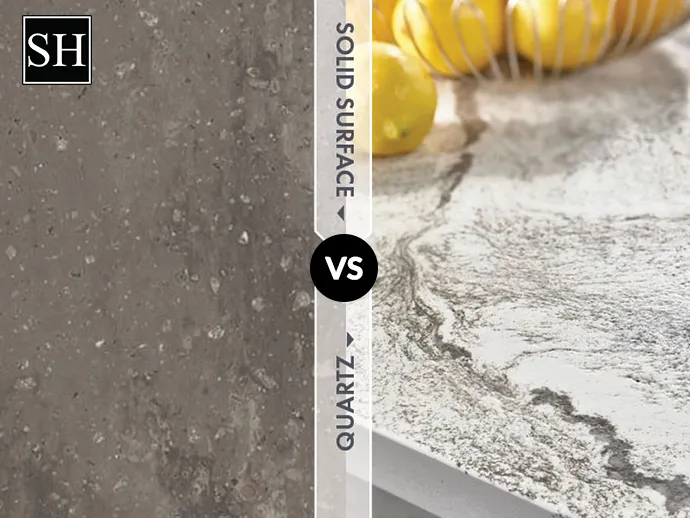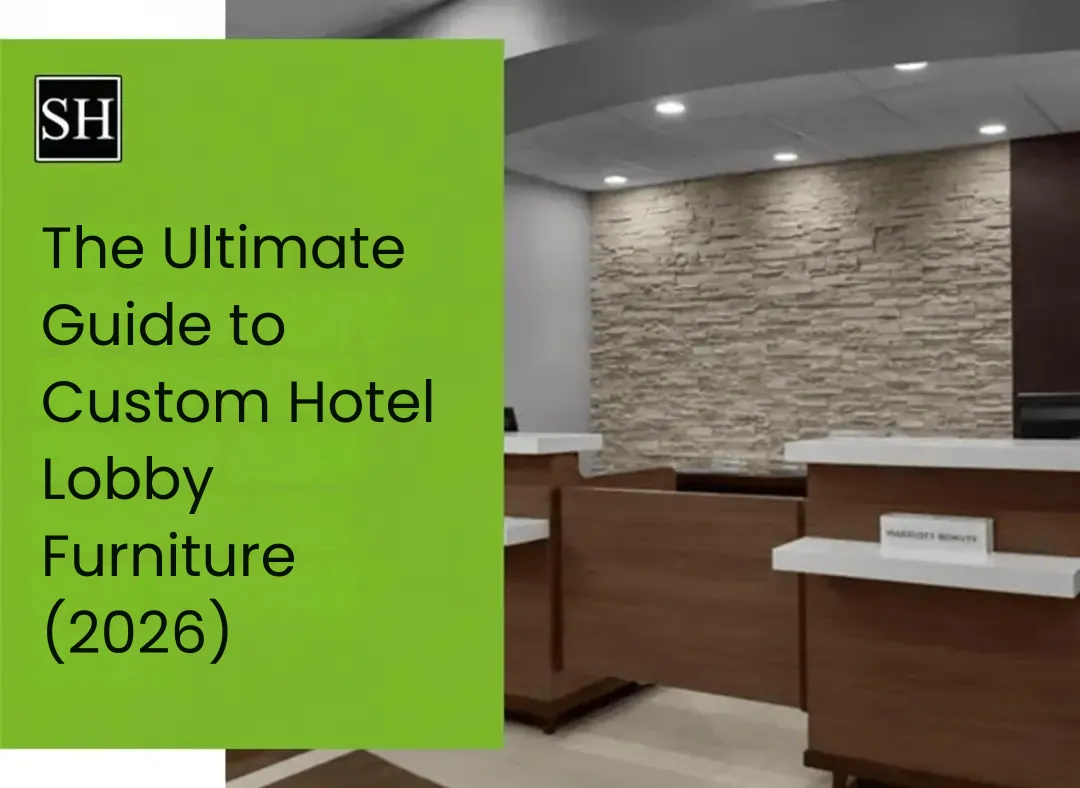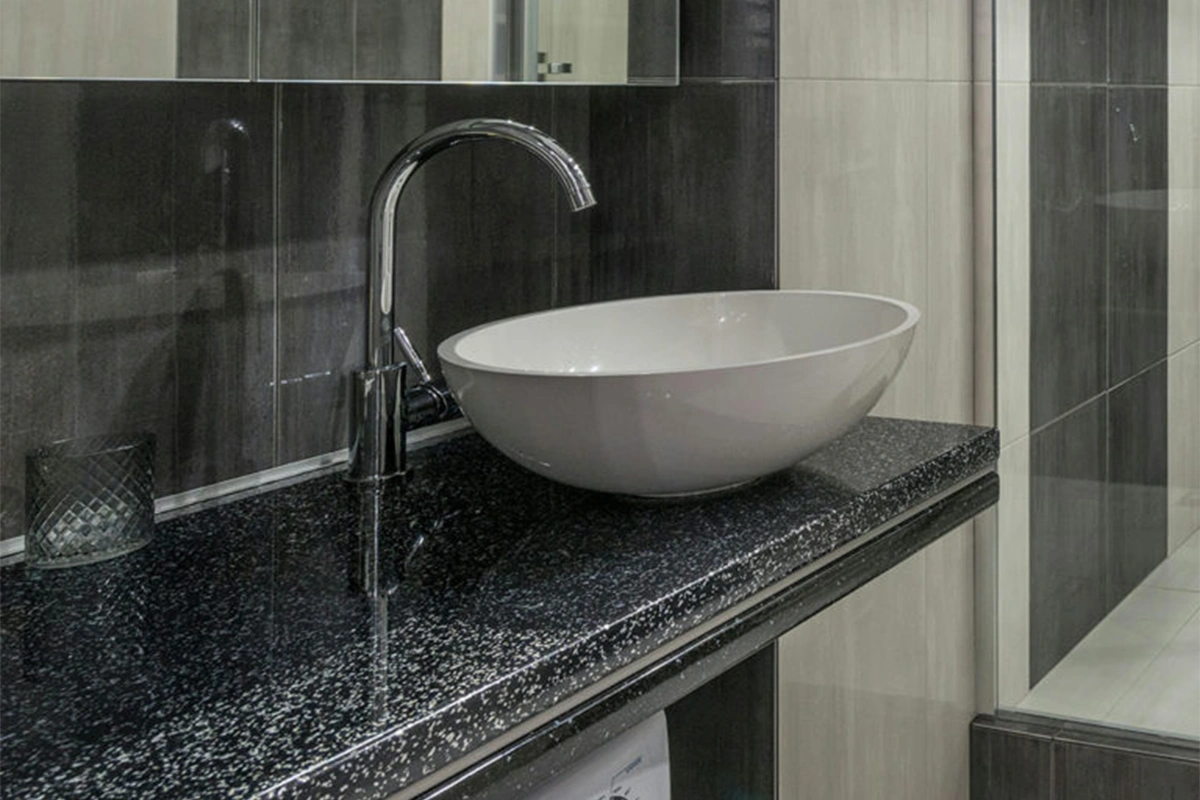
Comparing Hospitality FF&E: Solid Surface Furniture Versus Quartz Furniture
Few materials utilized in the hotel are casegoods, and another guestroom furnishing has a rival. The list will continue, like Laminate vs. Wood veneer, Granite vs. Marble, plywood vs Particle board, and Granite vs Marble. But, in this blog, we consider two of the best and most popular that often go head-to-leader in hospitality FF&E, i.e., solid vs. Quartz. Both materials are used in the hotel industry, and the amalgamation of solid surface and quartz mix perfectly and provides a unique level of functionality.
Each material differs from the others, and specific ones have their place in providing hotels with a look that will fulfill their intended requirements and improve ROI. Hence, we elaborate on these two materials and determine their differences in this article.
What is Quartz?
In hotel casegoods, quartz is used, which is not 100% natural. Instead, it is only about 90% crushed quartz. The remaining 10% includes either cement-based or polymeric binder. In an engineered stone, quartz is the opposite of a solid surface. Due to its composition, quartz will improve durability, which means it will take a hit without any damage symbol. Along a similar line, quartz is a material that is easily manufactured without losing its integrity. With its durability, quartz is scratch-resistant.
Furthermore, the quartz withstands temperatures up to 400℉. Unlike natural stone used in hotel casegood, quartz doesn’t need polishing, and reeling is included in regular maintenance. Quartz material is more expensive than solid surface. It means its ability to endure heavy use or the occasional accidental hard hit - means investing in quartz furniture is due to its longevity.
What is a Solid Surface?
It is a manufactured material with a solid surface that combines mineral dust, plastics, and resins. It will improve the pebbled appearance. It is a popular hospitality FF&E manufacturing facility; the solid surface can be fabricated in any shape, and hotel furniture designs come in numerous styles and looks. Similar to other lamination, a solid surface is created to look like other materials, like natural stone.
Additionally, a solid surface is available for purchase to similar specifications. It means you are not required to purchase giant sheets as you would with other materials like marble and granite. In terms of cost-effective material, a solid surface helps stretch the hotel's casegood budget further. However, the solid surface is prone to scratches and is less robust than other materials. Also, it is not heat resistant, which means it will be damaged if exposed to high temperatures from curling iron that hasn’t cooled down.
Solid Surface vs. Quartz
You can always go right with a solid surface or quartz if you consider it easy to maintain, durable to fit commercially, and super hygienic. However, these two materials have vital differences that dictate which options suit requirements. So, let’s discuss the qualities of both materials.
1. Heat Resistant
High heat conditions are not a vital factor in your facility, but heat resistance is a significant element for your countertops in many educational environments. Solid surfaces are perfect for heat resistance; from industrial kitchens to medical facilities, they become damaged or melt if they come in contact with heat. Hot utensils, surfaces, pans, and open flame are never put directly on solid surfaces; instead, use trivets and mats.
In contrast, quartz is heat resistant and bears temperatures exceeding 400 degrees F. It is generally preferred for high-heat applications like use in commercial kitchens. Although damaging quartz with heat is tough, using trivets and heat pads will secure the surface from further damage.
2. Installation
If you decide to install countertops by yourself, the best choice is to choose a solid surface. The solid surface will be cut swiftly with woodworking tools and built digitally indetectable seas, accomplished with more than adhesive and fine grit sandpaper. Its hardwood, lightweight, and non-splintering design makes reliable surface installation easy.
Unlike solid surfaces, quartz is easily cut using a particular tool and requires professional installation.
3. Scratch Resistant
Solid surfaces are scratch-resistant, and their enhanced use becomes more scratched with time. However, a solid surface will get irritated more easily than quartz and will quickly sanded and refinished to avoid minute surface scratches.
In contrast, Quartz is unscratchable and never creates even minor scratches after several years. Although quartz is scratch-resistant, it is not recommended to cut it directly; use cutting boards rather than which surface you choose.
4. Durability
In commercial facilities, counterparts like labs, manufacturing facilities, and medical centers with continuous use, unexpected friction, and chemical exposures are achieved today. The commercial countertops need to be durable and can’t be used on constant use but remain unchanged for years.
Solid and quartz surfaces will perform perfectly with constant usage, but like any other surface, they have certain limitations. Usually, quartz is more durable than solid, with better scratch and stain resistance. The solid surface performs perfectly and is swiftly refinished like new.
5. Cost
Both of the materials, in comparison to natural materials, are affordable. However, two materials are inexpensive in primary forms and can become highly expensive if you customize them. However, some hospitality furniture manufacturers can build it as per the customer preference at a budget-friendly rate.
Conclusion
The selection criteria between a solid surface and quartz for hospitality FF&E completely depends on the project's requirements. Solid surface offers high customization and a seamless appearance, while quartz provides durability at a potentially lower cost. If you are looking for the best materials and are still in chaos about which is best, consult Sara Hospitality. We have various materials that create the perfect ambiance for your space.
- SOFT SEATING
- BATHROOM VANITY
- FIXTURE EQUIPMENT
- Hospitality Casegoods
- Hospitality outdoor furniture
- Senior living furniture
- Hotel reception desk
- High end contract furniture
- Premium Hotel Bedroom Furniture
- Custom commercial furniture
- Hospitality Furniture Manufacturers in Canada
- Leading Hotel Furniture Manufacturers in Canada
- Casegood manufacture canada
- Hotel Casegoods
CATEGORIES
-

Requirements for Safe Senior Living Furniture in 2026
-

Best Armchairs for Elderly: A Hospitality Buyer’s Guide
-

Hotel Room Furniture Packages & Sets for Every Budget
-

Sustainable Casegoods for Hotels: Eco-Friendly Solutions for Modern Hospitality
-

The Ultimate Guide to Custom Hotel Lobby Furniture (2026)
RECENT POSTS
RELATED BLOGS

Best Armchairs for Elderly: A Hospitality Buyer’s Guide
John Smith | Feb 16, 2026


10 Trending Hotel Renovation Ideas In 2026!
Sara Hospitality | Feb 04, 2026











